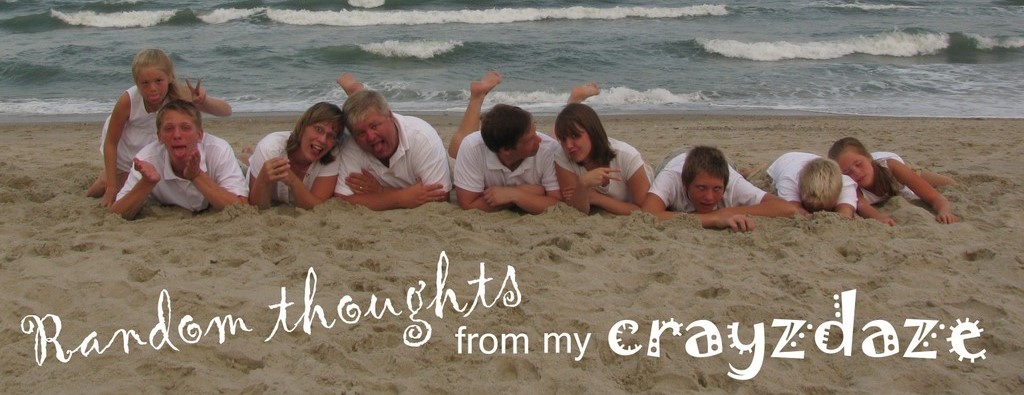(I thought I’d tell you a little more about the book I was trying to give Lindsay the other day.)
I’m not sure I would have liked this book if someone had introduced me to it 23 years ago.
When Russ and I were newlyweds, we had a guest speaker one night at homemaking. She worked with Stephen Covey, and was there to teach us some of the ideas that he was working on.
I only remember one thing that she said.
"We also can choose to be proactive and not let our situation determine how we will feel.”
I could not comprehend this in my 20 year old brain. I remember saying to her, “Do you mean that if my husband is mean to me, I can ‘choose’ not to get mad????”
All I could see was that if he was mean and I was mad, it was his fault. (Wasn’t it???)
It was a mystery to me and I am certain she was frustrated by her inability to explain well enough for me to understand.
Several years after that Covey published his book and I read it. In the book his explanations helped me understand what I had not been able to see before, and when I prayed and asked Heavenly Father to show me the truth of this in my life, he did.
Not that I chose my reactions well much of the time, but I did know that it was possible.
-----------
Several years ago one of my friends recommended I read the book “Real Love: The Truth About Finding Unconditional Love & Fulfilling Relationships” by Greg Baer.
The premise of the book is that most of us have not received much unconditional love (called “real love” in the book) in our lives. Instead, we received conditional love; when we behaved well and were nice our parents were loving to us. When we behaved poorly or badly they were angry or frustrated with us.
This taught us that love is conditional, or that we have to buy it with our behavior. Why is this a problem?
Imagine that every time you pay me fifty dollars, I tell you I love you. We could do that all day, but at the end of the day would you feel loved? No, because you’d know that I “loved” you only because you paid me. We simply can’t feel fulfilled by love we pay for. We can feel loved only when it is freely, unconditionally given to us.
Greg Baer, the author, says that the only kind of love that truly satisfies us and makes us feel loved is unconditional—when someone cares about our happiness without any thought of what they might get for themselves.
This was interesting to me because I could see myself in many of the behaviors he described that we use to “purchase” what he calls “fake” (conditional) love. For as much of my life as I can remember, I’ve craved affirmation from the people around me. I even thought that affirmation was probably my primary love language, but as I’ve practiced these principles my need for affirmation has calmed down a lot.
The other reason this book felt important to me was that I recognized myself in the parenting descriptions—I could see how conditional I’ve been in my reactions towards my own children. Sure—when they’re convenient I am a totally loving mom. But let me be tired or them be in the slightest bit inconvenient (loud, obnoxious, rude, tired, or heaven forbid childish!!) and I was frustrated, irritated, or angry.
I felt excited to think that there might be something that could really help me to be the mom I want to be—to be the kind of mom who’s kids feel like they are always loved, not just loved when they’re well behaved.
Interestingly enough, my kids would tell you that they knew I loved them, even if I was angry or unkind or yelling. Just like you would probably tell me about your parents. I believe that we have to tell our stories that way, because it is unbearable to admit that we feel differently. So I could certainly keep justifying my actions, telling myself that I’m a “good enough” mother.
But that’s not what I want. I want to feel better myself, and I want to be a better mom. And I think this book seems to track pretty well with the scriptural principles like
“charity suffereth long and is kind…”
and
“though I have all faith, so that I could remove mountains, and have not charity, I am nothing…”
I’ve never been able to figure out how to actually get that charity, or pure love like Christ has. Especially in the midst of a moment of frustration. But as far as I can tell, the scriptures make no excuse for those moments. They don’t say
“Charity suffereth long, and is kind, as long as others are kind to her.”
And they don’t say
“if I have not charity, I am nothing, unless it was a moment where it was just too hard to have charity and I’m sure you all understand about those kind of moments.
They simply say that we are to have charity.
I think this is helping…




Hmm I will have to add that to my list of things to read. :) I like your book reviews by the way. Although I will admit I haven't had time to read anything yet. :)
ReplyDelete